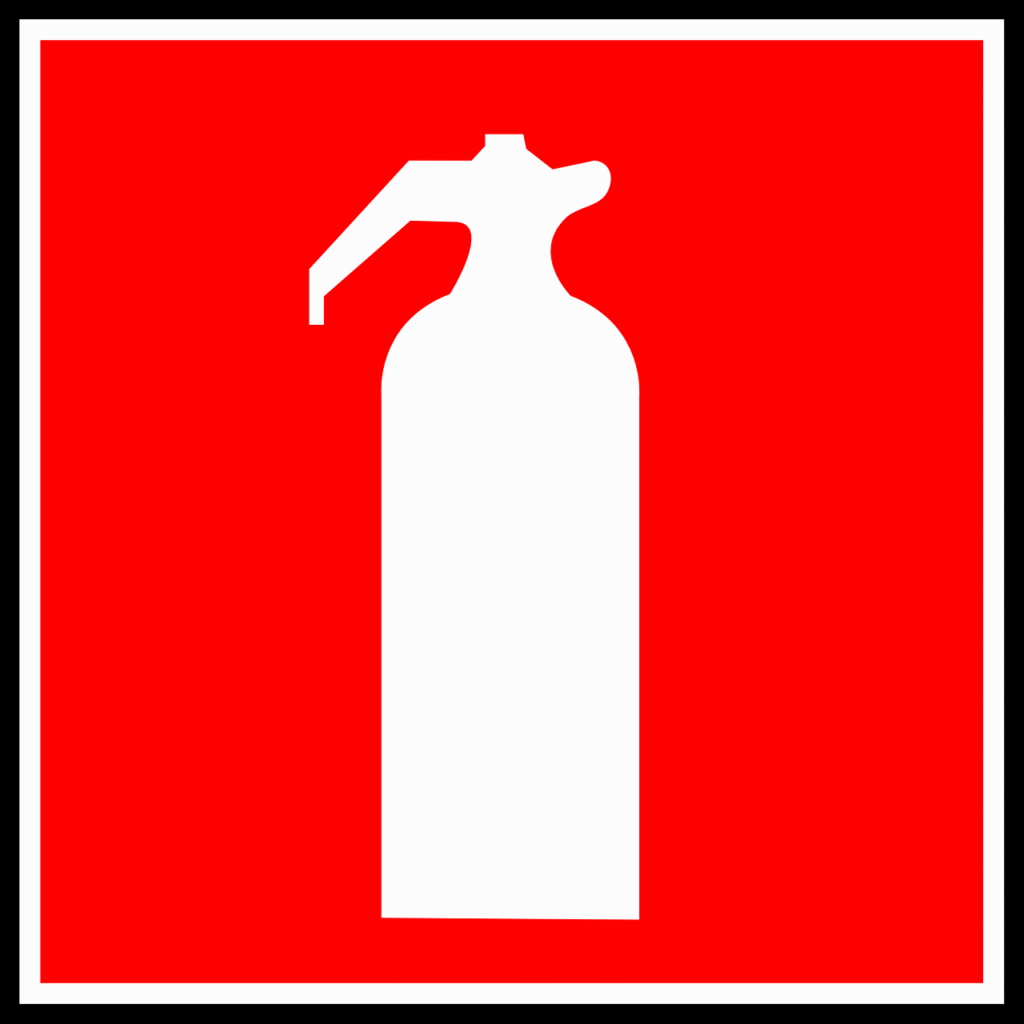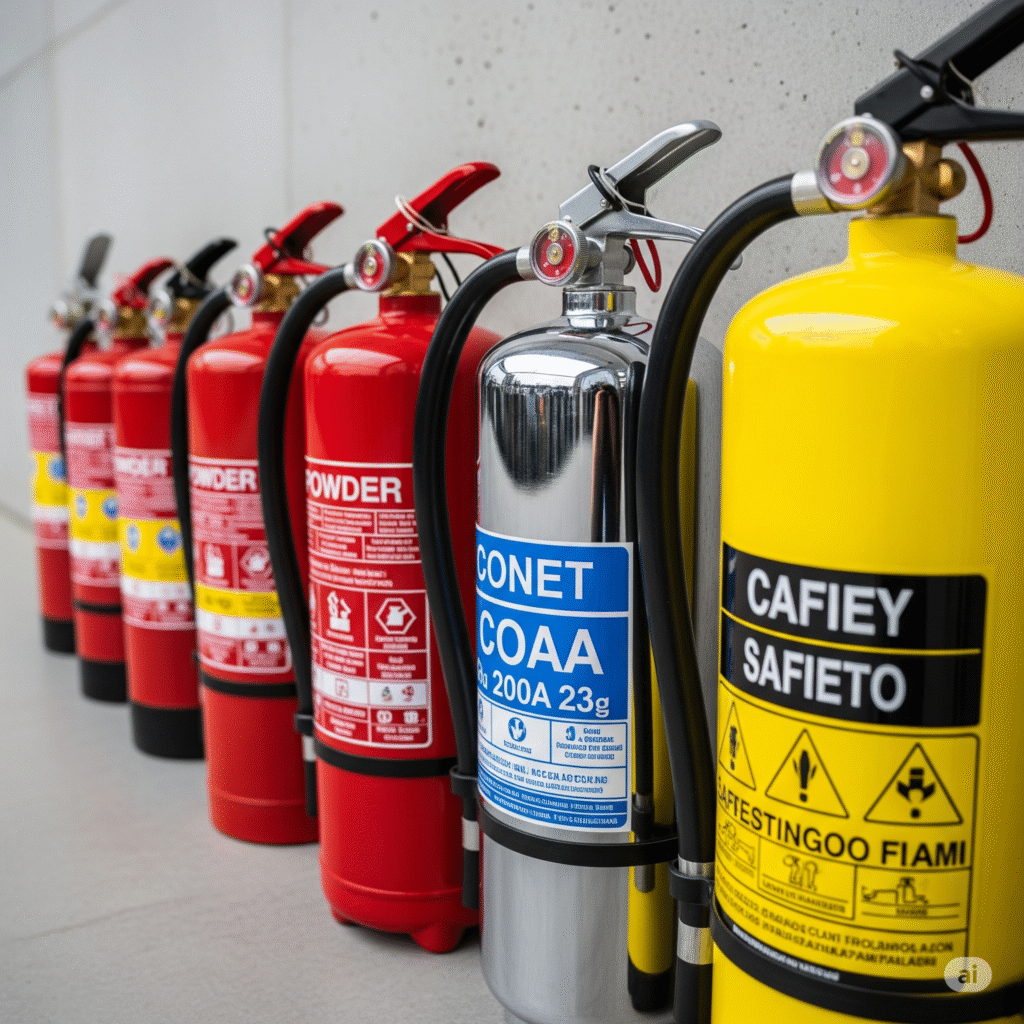Why Every Kolkata Property Needs a Fire Extinguisher
A fire extinguisher could have saved the day! Kolkata has seen many fire incidents recently. Some could have been avoided had there been a fire extinguisher installed! From bustling commercial hubs like Burrabazar with its aged infrastructure and dense electrical wiring to residential complexes and the increasing trend of mixed-use buildings, the threat of fire is an ever-present concern. Recent incidents and fire safety drives by authorities highlight the critical need for proactive fire safety measures. Your first, and often most crucial, line of defense? A well-maintained and correctly chosen fire extinguisher.
This isn’t just about ticking a box; it’s about safeguarding lives, property, and livelihoods. Understanding the different types of fires and the corresponding extinguishers is paramount, as using the wrong type can be ineffective or even worsen the situation.
Understanding the A, B, C’s (and D & K!) of Fire
Fires are classified based on the type of fuel that is burning. Knowing these classifications is the first step in choosing the right extinguisher:
- Class A: Involves ordinary combustible materials like wood, paper, cloth, rubber, and many plastics. These are common in all types of properties.
- Class B: Involves flammable liquids such as petrol, diesel, oil, paint, and also flammable gases. These are risks in kitchens, garages, workshops, and industrial settings.
- Class C: Involves energized electrical equipment. Think of short circuits in wiring, overloaded appliances, or faulty electrical panels. This is a significant risk in both homes and businesses given Kolkata’s often-strained electrical infrastructure.
- Class D: Involves combustible metals like magnesium, titanium, and sodium. These are typically found in industrial settings and specialized laboratories.
- Class K (or F in some regions): Involves cooking oils and fats in commercial kitchens. With Kolkata’s vibrant food scene and numerous eateries, this is a crucial classification to consider for restaurants and food processing units.

Matching the Extinguisher to the Hazard: Not a One-Size-Fits-All Solution: fire extinguisher types
Just as fires differ, so do fire extinguishers. Each is designed to tackle specific fire classes:
- Water Extinguishers: Primarily for Class A fires. They cool the burning material. Never use on Class B (can spread the flammable liquid) or Class C (risk of electrocution) fires.
- Foam Extinguishers: Effective on Class A and Class B fires. They cool and smother the flames.
- Dry Chemical Powder (ABC or BC) Extinguishers: These are versatile and can be used on Class A, B, and C fires (hence ‘ABC’). BC powder is suitable for Class B and C fires. They work by interrupting the chemical reaction of the fire. These are widely used due to their multi-purpose nature.
- Carbon Dioxide (CO2) Extinguishers: Ideal for Class B and C fires. CO2 displaces oxygen and cools the fire. It leaves no residue, making it suitable for electrical equipment and sensitive machinery. However, they are less effective in open, windy areas and can pose an asphyxiation risk in confined spaces.
- Wet Chemical Extinguishers: Specifically designed for Class K (cooking oil) fires. They work by creating a soapy layer that smothers the flames and cools the oil. Essential for commercial kitchens.
- Specialized Dry Powder Extinguishers: For Class D (combustible metal) fires. These require special application techniques.
The Kolkata Context: Residential vs. Commercial Needs
For Residential Properties in Kolkata: A multi-purpose ABC Dry Chemical Powder extinguisher is generally a good choice for homes, covering most common household fire risks like those from solid combustibles, flammable liquids (like in a kitchen or garage), and electrical faults. Considering the common issues of older wiring in some parts of Kolkata, having protection against Class C fires is vital.
For Commercial Properties in Kolkata: The requirements are more diverse.
- Offices: ABC Dry Powder and CO2 extinguishers (for server rooms and electrical panels) are typically needed.
- Retail Stores & Godowns: ABC Dry Powder extinguishers are crucial, especially in areas like Burrabazar, which are prone to fires involving textiles, plastics, and other stored goods.
- Restaurants & Hotels: A combination of Wet Chemical extinguishers for kitchens (Class K) and ABC Dry Powder and CO2 extinguishers for other areas is essential. Recent government guidelines for commercial buildings in West Bengal emphasize the need for functional fire suppression systems, including sprinklers and appropriate portable extinguishers.
- Industrial Units: The choice will depend on the specific materials and processes involved, potentially requiring specialized extinguishers like those for Class D fires.
It’s crucial for businesses to comply with the West Bengal Fire Services Act, 1950, and recent directives focusing on fire safety audits and regulatory compliance. This includes ensuring clear emergency exits, proper ventilation, and valid fire safety certificates.
Basic Operation: Remember P.A.S.S.
Knowing how to use an extinguisher is as important as having one. The P.A.S.S. method is a simple way to remember the steps:
- PULL the pin. This will break the tamper seal.
- AIM low, pointing the nozzle or hose at the base of the fire.
- SQUEEZE the handle slowly and evenly to release the extinguishing agent.
- SWEEP the nozzle from side to side, covering the base of the fire until it appears to be out. Move closer as the fire diminishes.
Always ensure you have a clear escape route behind you before attempting to fight a fire. If the fire is too large, spreading rapidly, or you are unsure, evacuate immediately and call emergency services.
The Critical Role of Installation and Maintenance of Fire Extingusher
Simply buying an fire extinguisher isn’t enough.
- Proper Installation: Extinguishers should be installed in accessible and visible locations, preferably near exit routes. They should be mounted at the correct height and not obstructed.
- Regular Inspection: Visually inspect your extinguishers monthly. Check for:
- Physical damage (dents, rust, leaks)
- Pressure gauge reading (the needle should be in the green zone)
- Intact safety pin and tamper seal
- Clear and legible instructions
- Unobstructed nozzle or hose
- Professional Maintenance: Annual maintenance by a qualified professional is crucial. This includes a thorough examination, and if necessary, recharging or hydrostatic testing (pressure testing of the cylinder, typically every 5 years for most types). Records of inspections and maintenance should be diligently kept.
This is where expert sourcing and maintenance services become invaluable. Ensuring you have the right type of extinguisher for your specific Kolkata property, that it’s correctly installed, and regularly and professionally maintainedprovides true peace of mind and effective first-response capability.
Don’t wait for a tragedy to strike. Investing in the correct fire extinguishers and their upkeep is a small price to pay for the safety of your property, your loved ones, or your business in the vibrant heart of Kolkata. Make it your first line of defense.

